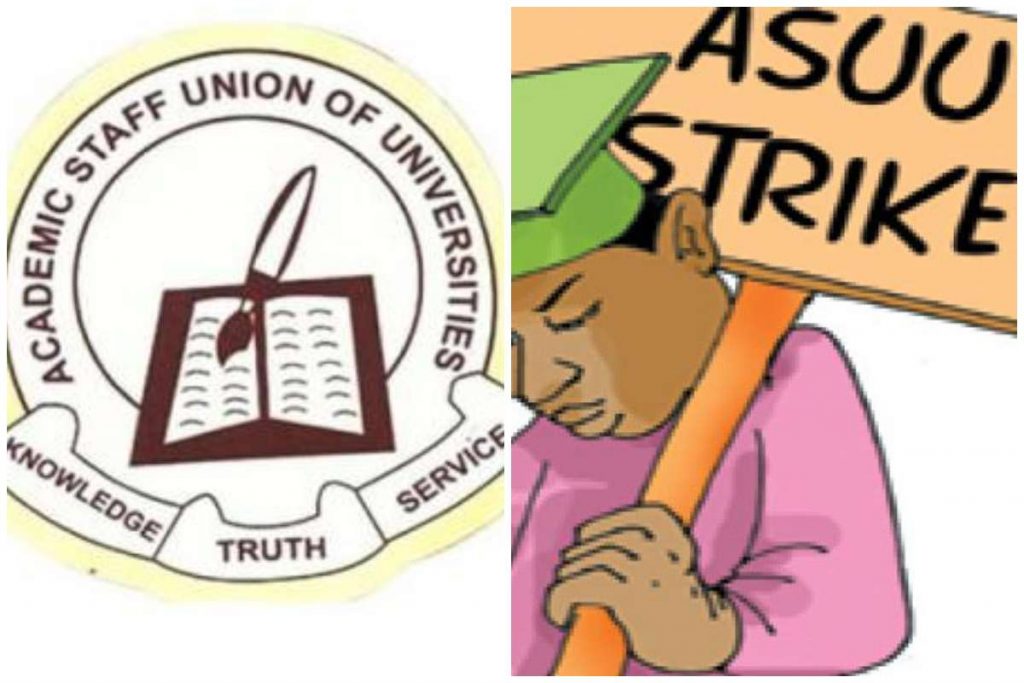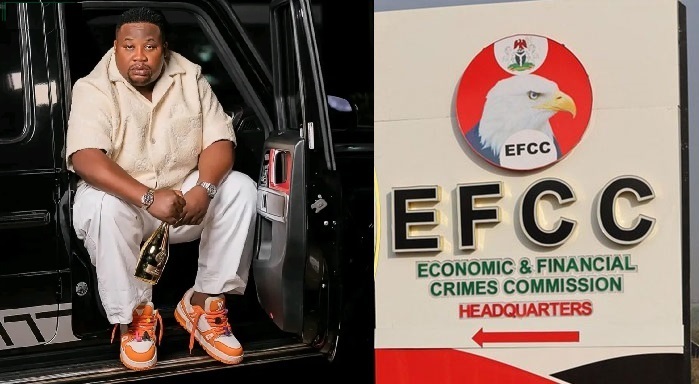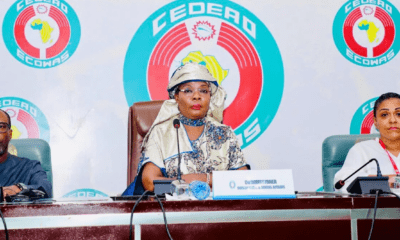News
President Tinubu backs direct ECOWAS election

President Bola Tinubu has called on the Economic Community of West African States (ECOWAS) to consider electing its members directly through universal suffrage, instead of doing so through national parliaments.
The President made this known at the inauguration of the 6th Legislature of the ECOWAS parliament on Thursday in Abuja.
He explained that doing so would give citizens of member states a say in who represented them.
He said: “The practice of directly electing public officers aligns with democratic principles that Nigeria upholds. This principle is also in line with the spirit of the ECOWAS Protocol on democracy and good governance.
“We believe this will ensure that citizens will have a direct say in their representation and the legitimacy and credibility it will provide.
“As a one-time legislator myself, I look forward to reviewing the proposal regarding this matter. We stand to support the direct elections into ECOWAS Parliament.”
The President assured members of the Sixth ECOWAS Parliament that Nigeria, as host of the community, would continue to support the Parliament to achieve its objectives.
Amb. Yusuf Tuggar, Nigeria’s Minister of Foreign Affairs, in a goodwill message, called for collaboration among ECOWAS executive, judicial and legislative arms, stressing that it was critical for effective, responsive and transparent governance.
He urged the new members of Parliament to ensure that their positions on key issues were harmonised with the decisions of the Authority of ECOWAS Heads of State and Government.
Tuggar said Parliament was crucial in the face of various challenges confronting ECOWAS; hence, the balance between executive, judicial and legislative arms was critical to address subregional peace, stability, security and unity.
He said: “It is, therefore, imperative that the Parliament continues to work in synergy with the ECOWAS Commission and other Institutions that serve as the executive and judicial arms of our organisation.
“Collaboration between the Commission, Court and Parliament is essential to ensure the smooth implementation of policies and programmes that benefit our citizens.
“I encourage you to maintain constructive dialogue with other bodies and to align your efforts with the broader objectives of ECOWAS.”
He explained that consistency in ECOWAS collective stance would strengthen its voice on the international stage and prevent any perception of disunity within the organisation.
Tuggar said the Council of Ministers looked forward to more robust engagement and collaboration with the Parliament to amplify ECOWAS values and increase its visibility through people-oriented programmes and projects.
President of the ECOWAS Commission, Dr Omar Toure, in his speech, warned that ECOWAS was currently facing the threat of disintegration, stressing that the subregion’s challenges were numerous and diverse.
He emphasised that disintegration would aggravate the subregion’s security challenges, culminate in political isolation, job cuts, as well as affect the movement of ECOWAS citizens under its protocols.
“ECOWAS is faced with the risk of integration following the threat by Burkina Faso, Mali and Niger on January 29, 2024 of their intentions to quit the bloc.
“Considering the perceived consequences of their decisions, ECOWAS opened a dialogue and initiated other immediate measures, which included representatives from these three countries to join the dialogue to resolve the issues.
“The Commission, therefore, stands to work with the Parliament and all other stakeholders towards achieving success in line with the objectives of ECOWAS,” Toure said.
President of the Nigerian Senate, Godswill Akpabio, in his remark, described the inauguration of the 6th ECOWAS Legislature as the dawn of a new era in West Africa.
He said that the event was an opportunity for ECOWAS “to build bridges of unity instead of building Berlin Walls of isolation.”
“We should ensure free movement of goods and services within the Community and remove obstacles facing us,” the Senate President said.
Also speaking, former Speaker of the 5th Parliament, Sidie Tunis, called for the election of Members into the ECOWAS Parliament by direct universal suffrage, saying that the Parliament under him had already initiated the move
While noting that it was customary for each legislature to set its own agenda, he passionately appealed that, henceforth, election of Members into the ECOWAS Parliament by direct universal suffrage be made top priority by the 6th Legislature.
“The 5th Legislature raised a lot of awareness about the matter, and I can only hope that the 6th Legislature will strengthen the fight for direct election, as it is a requirement for representative governance.
“I am confident that with the quality of membership you have, faithfully serving the interest of the peoples of the Community, success will be achieved in these regards,” Tunis said.
President Tinubu, who is the Chairman of the ECOWAS Authority of Heads of State and Government, officially inaugurated 97 members into the 6th ECOWAS parliament.
News
UniAbuja: ASUU begins indefinite strike


The Academic Staff Union of Universities, ASUU, Abuja chapter, has begun an indefinite strike to draw attention to developments bordering the union.
The Abuja chapter of ASUU announced its decision to embark on the strike on Thursday at the end of its congress, held at the Permanent Site of the institution.
Sylvanus Ugoh, who is the UniAbuja Chairman of the union, told Leadership that the union had resolved to embark on a total and indefinite strike with immediate effect.
More to follow…
News
Senate confirms minimum age requirement for admission into universities


The Nigerian Senate has made it clear that the statements regarding the potential increase of the age limit to 18 years were individual viewpoints.
The Senate stressed that any adjustments to the age limit would require proper legislative procedures, whether they involve lowering or raising the limit.
Chairman of the Senate Committee on Media and Public Affairs, Adeyemi Adaramodu, made this known in an interview with journalists on Wednesday.
Recall that last week, Prof. Tahir Mamman, the Minister of Education, stated that the government is thinking about changing the minimum age for entering universities to 18 years old.
“Comment on the minimum age requirement for admission is not a law,” the lawmaker said.
“So it is just an opinion. It’s not a law. By the time the Senate resumes, whoever wants to bring that one out to make it a law, will now bring it and then the procedures will take place.
“You can bring whatever to the floor in form of a bill. When you bring it, there’s going to be public hearing.
“All the stakeholders will sit down and talk about it. The parents, teachers, legislators, civil society organisations, even foreign organisations.
“We will sit down and talk. Even if they say that the minimum age should be 30 or 12, we will all discuss it in an open forum. So it’s still a comment which cannot be taken to be the law.”
News
Alleged Naira abuse: Cubana Chief Priest, EFCC explore out of court settlement


A Federal High Court in Lagos has fixed June 5 for report of settlement in a case against celebrity bartender, Pascal Okechukwu, popularly known as Cubana Chief Priest, over alleged abuse of the naira.
The Economic and Financial Crimes Commission (EFCC) had on April 17 arraigned Okechukwu on three counts of allegedly spraying and tampering with the naira notes during a social event at Eko Hotel in Lagos.
He had pleaded not guilty to the charge and was granted bail in the sum of N10 million.
Justice Kehinde Ogundare had then adjourned the case until May 2, for hearing of the preliminary objection and trial.
When the case was called on Thursday, Mrs Bilikisu Buhari appeared for the prosecution, while Mr Chikaosolu Ojukwu (SAN), announced appearance for the defendant .
The defence counsel informed the court that the parties were exploring a settlement and have applied that the matter be settled pursuant to the provisions of Section 14(2) of the EFCC Act.
He told the court that if the prosecution confirmed the position as true, there would be a need to apply for a withdrawal of the defence’s preliminary objection and allow for a reconciliation.
In response, the prosecutor confirmed the position as stated by the defence counsel and told the court that the application was still being considered.
Following the position, the defence counsel applied for a withdrawal of the preliminary objection since there was no objection from the prosecution and the court granted the same.
The court, consequently, adjourned the case until June 5, for the report of settlement.
In the charge, the defendant was said to have tampered with the funds in the denomination of N500, while dancing at the social event in Eko Hotels and Suites.
The offence contravenes the provisions of Section 21(1) of the Central Bank Act of 2007.
The EFCC had on April 5 secured the conviction of popular cross-dresser, Idris Okuneye, also known as Bobrisky, on similar charges for which he was sentenced to six months imprisonment.
-
capital market2 years ago
Rt.briscoe, FBNH, Others halts negative performance of stock market
-
Finance3 months ago
Court orders Sen. Victor Umeh to repay N136m bank debt to AMCON
-



 Abuja Update2 months ago
Abuja Update2 months agoUNDP, FG partnership needed to achieve inclusion, equity- Minister
-
Abuja Update1 month ago
Banks drive stock market performance with N147bn gain
-



 Business1 week ago
Business1 week agoTingo Group unveils Tingo Electric, Tingo Cola drink at Lagos launch
-



 Health2 weeks ago
Health2 weeks agoCapacity training will reduce migration of health workers- NPHCDA
-
News4 months ago
Oil thieves sponsoring malicious media campaign against Navy – Spokesman
-



 Infotech1 month ago
Infotech1 month agoWorld Backup Day: NITDA urges Nigerians to ensure backup of data
















